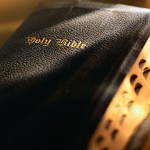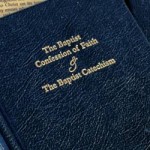Another blog post on confessions? Yes, once again, because we’ve been enjoying our London Baptist Confession course, and I’ve been enjoying preparing for it. We believe it is important for our families to understand our beliefs as a church and our heritage as “Particular Baptists” or “Reformed Baptists.”
So, what is a confessional church? It is one that is linked to a firm and concise summary of the faith; in fellowship with other confessional churches, both now and through church history; and a church that is clear in its teaching because it has a well-organized and tested standard. Many reject confessions and claim “the Bible is our confession! No creed but Christ!” (Never mind that that statement itself is a creed) That’s all fine, until we realize the Bible is used and misused by a wild range of churches in a myriad of ways. A confession summarizes the Bible’s major doctrines and lays forth a helpful guide to the Bible’s teaching.
 Is a confession authoritative? Most assuredly we say the Bible is the ultimate standard – Sola Scriptura!. But all Christians and even some non-Christians can say that. Affirming the authority of the Bible is a broad confession, and for purposes of teaching and unity, the statement is too broad to be helpful.
Is a confession authoritative? Most assuredly we say the Bible is the ultimate standard – Sola Scriptura!. But all Christians and even some non-Christians can say that. Affirming the authority of the Bible is a broad confession, and for purposes of teaching and unity, the statement is too broad to be helpful.
A confession of faith, however, is a document that expresses what we believe the Bible means. It is a well-tested, carefully studied, scripture-backed, historical document that carefully outlines what a church believes that Bible teaches on the most important and necessary doctrines. Therefore, because the confession is a Biblical document, it is used as a governing document. Just as a church’s constitution and by-laws might be a standard of operation, so a confession of faith forms a standard. In that way, it is authoritative. One way that we use our confession at our church is that we require our elders to hold to full subscription to our confession. This unifies us in a way that preserves peace and helps us work together. We are also able to unite with like-minded sister congregations who share the same confessional standard. Our church members do not need hold to a full subscription of the confession, but they have all agreed to be taught according to it. This helps preserve peace and order in the church, and that is a blessing for all!
How does a confession work? Churches often publish a statement of faith or a list of key beliefs on their website. This is helpful in evaluating a church. Often, however, they are vague, incomplete, or simply inadequate. A confession of faith, on the other hand, while it is a statement of faith, forms a more robust declaration of beliefs. This helps us summarize and systematize what is in the Bible. Further, a confession is an excellent tool for understanding what a church believes about the Bible, and for teaching our children sound Biblical doctrine in a systematic manner. A brief statement of faith is not usually sufficient as a guideline for teaching.
Confessions are usually topical, teaching about subjects as you might learn about them in a class room. Our confession has 32 chapters, each covering one topic. Topics include subjects like the Holy Scriptures, God’s Covenant, Saving Faith, Religious Worship, and Marriage. A confession gives scripture proofs as well, directing us to the Word of God, our ultimate authority.
A confession also acts as a fence that helps churches and families remain grounded in sound doctrine rather than falling off into a ditch of error. A confession helps insure peace among brethren, agreement in the fellowship and common understanding about the Bible.
 We at Cornerstone are committed to our confession, the Second London Baptist Confession of 1689, as a faithful summary of the doctrines in the Bible that distinguish us from other reformed brethren. Ours is one of the major reformed confessions of the tumultuous 17th century in England. It is a blend of two other wonderful confessions: the Westminster Confession of Faith of the Presbyterians, and the Savoy Declaration of the non-conformist congregationalists. Our confession has some distinctive particulars added. Our heritage is deep, our forefathers labored long and hard and risked their lives for the faith. We ought to cherish, use and gain from their work.
We at Cornerstone are committed to our confession, the Second London Baptist Confession of 1689, as a faithful summary of the doctrines in the Bible that distinguish us from other reformed brethren. Ours is one of the major reformed confessions of the tumultuous 17th century in England. It is a blend of two other wonderful confessions: the Westminster Confession of Faith of the Presbyterians, and the Savoy Declaration of the non-conformist congregationalists. Our confession has some distinctive particulars added. Our heritage is deep, our forefathers labored long and hard and risked their lives for the faith. We ought to cherish, use and gain from their work.

